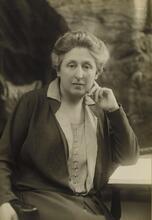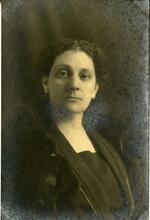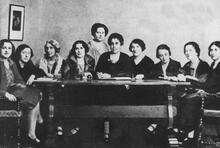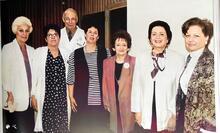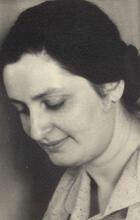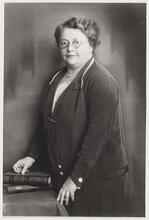Henrietta Franklin
A leading advocate for the causes of education, women’s rights, and Liberal Judaism, Henrietta Franklin dedicated her life to numerous progressive causes. The eldest daughter of Samuel Montagu and Ellen Cohen Montagu, Henrietta married Ernest Franklin in 1884. She particularly championed the Parents’ National Education Union, acting as honorary secretary for a remarkable 70 years, and received a C.B.E for her educational activities in 1950. A supporter of the women’s suffrage movement, Franklin joined the Jewish League for Woman’s Suffrage and the National Union of Women’s Suffrage Societies. She continued to campaign for secular women’s rights after World War I, serving on many committees including the National Council of Women, as well as supporting her sister Lily Montagu’s Liberal Judaism movement.
Family and Education
Henrietta Franklin, known as Netta, dedicated her life to the causes of education, women’s rights, and the Liberal Judaism movement. Born in London on April 9, 1866, Netta was the eldest of the ten children born to Samuel Montagu, later the first Baron of Swaythling (1832-1911), and Ellen Cohen Montagu (1843-1919). Her siblings included Lily Montagu, (1873-1963), founder of England’s Liberal Jewish movement, and Edwin Montagu (1879-1924), the Liberal Party politician.
Raised in an Orthodox Jewish family, Netta was educated in London at Doreck College and King’s College for Ladies. In 1885, she married Ernest Louis Franklin (1860-1950), the son of Ellis Franklin and Adelaide Montagu, and the couple had two daughters and four sons between 1886 and 1903. In 1909, Franklin had her leg amputated by the female surgeon Dame Louise Aldrich Blake after being diagnosed with sarcoma and used a prosthesis for the last fifty-five years of her life.
Work in Education
Franklin was best known for her life-long work in education. After a meeting in 1890 with the educational reformer Charlotte Mason (1842-1923), she became involved in the Parents’ National Education Union (PNEU), holding the position of honorary secretary from 1894 to 1964, a remarkable 70 years. The PNEU promoted a system of individualized progressive pre-school and primary education that influenced English educational theory at the turn of the twentieth century. In 1892 Franklin opened the first school in London to follow these principals. She gained national and international exposure for the PNEU, in part through her public lecture tours across Europe and the United States. Furthermore, her financial generosity likely made a material difference to the longevity of the organization. In 1950, Franklin received a C.B.E. for her educational activities. After her death, four scholarships were established in her memory at PNEU schools.
Liberal and Feminist Causes
Alongside her lifelong commitment to education, Franklin was also active in a host of liberal and feminist causes. Sympathetic to her sister Lily’s vision for reforming British Judaism, she hosted the first meeting of the Jewish Religious Union at her home in February 1902. In fact, both sisters appear to have been denied their full inheritance in their father’s will for failing to revert to Orthodoxy. Franklin remained a strong supporter of the Liberal Movement, and in 1922 the sisters published Daily Readings from the Old Testament.
Like many Jewish women (and some men), Franklin became active in the British suffrage movement. A member of the National Union for Women Suffrage Societies (NUWSS), she served as its president in 1916-1917. She was also a member of the Jewish League for Woman Suffrage (JLWS), founded in 1912 and dedicated to attaining suffrage in Britain and equal religious rights for women. At its first meeting Franklin declared, “Judaism had taught the world to do justice ... they had no right to be here at all, unless they tried to make the world better.” Many of the League’s meetings were subsequently held at Franklin’s home.
During the First World War, Franklin became part of a national campaign for peace as early as June 1914, and she helped found the Jewish Peace Society, acting as vice-president alongside her sister Lily. She was also a financial supporter of the Women’s International League for Peace and Freedom.
Franklin continued to support the advancement of women’s rights after the war, serving as a vice-president of the National Union of Societies for Equal Citizenship from 1920 and the chair of its subsequent incarnation as the National Council for Equal Suffrage from 1935; its president Eva Hubback (1886-1949), was a relative of the Montagu family. From 1925 to 1927, Franklin served as the president of the National Council of Women (NCW), Britain’s umbrella organization of women’s groups. Under her presidency, the NCW’s drive for social welfare programs resulted in national legislation protecting women and children. As a prime mover in the International Council of Women, England’s NCW extended its influence to international feminist projects.
From 1933, Franklin became involved with refugee work, aiding those fleeing Nazi Germany. She held regular receptions for refugees at her home in Porchester Terrace, Bayswater, and even housed the Weiss family for five years after they were forced from Germany.
Legacy
Henrietta Franklin died at her home in St John’s Wood, London, on January 7, 1964. Her obituary in the Jewish Chronicle noted that she “had maintained an active association with some of the educational, religious and charitable organizations to which she has given long years of service.” Franklin, her sister Lily, and other members of the Franklin family demonstrated an extraordinary involvement in campaigns for equal rights and social welfare during the first half of the twentieth century. In 2018, Franklin was commemorated alongside 59 fellow suffragists on the plinth of the Millicent Garret Fawcett statue in Parliament Square. A woman of seemingly undiminishing energy, she dedicated her life to many liberal causes, although education was arguably her greatest; “I at once felt that the PNEU was the one ‘cause’ for me.”
Adam, H. Pearl, ed. Women in Council. London, New York, Toronto: 1945.
Gibbon, Monk. Netta, London: Routledge and Kegan Paul, 1960.
Hopkinson, Diana. Family Inheritance: A Life of Eva Hubback. London and New York: Staples Press, 1954.
International Council of Women. Report, 1912–1913.
Jewish League for Woman Suffrage, First Annual Report 1913–1914. The Women’s Library at LSE, London.
Jewish Chronicle.
Jewish League for Woman Suffrage Papers. Klau Library, HUC-JIR.
Kuzmack, Linda Gordon. Woman’s Cause: Jewish Woman’s Movement in England and the United States, 1881–1933. Columbus: Ohio State University Press, 1990.
Lily Montagu Papers: Ellen M. Umansky Microfilm collection. American Jewish Archives. Cincinnati, Ohio.
National Union of Societies for Equal Citizenship. Annual Reports 1918-39. The Women’s Library at LSE, London.
Oldfield, S. “Henrietta [Netta] Franklin (1866–1964).” Oxford Dictionary of National Biography, https://0-www-oxforddnb-com.catalogue.libraries.london.ac.uk/view/10.10….
Summers, Anne. Christian and Jewish Women in Britain, 1880-1940. Living with Difference. London: Palgrave Macmillan, 2017.
Umansky, Ellen. Lily Montagu and the Advancement of Liberal Judaism: From Vision to Vocation. New York: Mellen, 1983.


